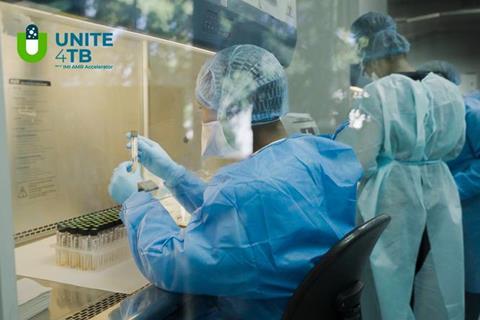TB is a major threat to public health, and is among the leading causes of death worldwide. In 2021, the disease claimed the lives of 1.6 million people, making it the second leading infectious killer after COVID-19. Drug-resistant TB and long treatment regimens have increased the urgency for action and investment in TB research.

For people affected by TB, the most important outcome is rapid access to better regimens of shorter treatment duration and with fewer side effects. UNITE4TB is engaging with key societal stakeholders to ensure that its novel regimens will be made available as efficiently as possible.
UNITE4TB’s innovative phase 2B/C trials will test 14 combinations of nine existing drugs, as well as two newly developed candidates (GSK656 and BTZ-043). The ultimate aim is to create regimens that can further improve multidrug-resistant (MDR) treatment, and also be effective for drug-sensitive TB.
Combining compounds
UNITE4TB’s explorative regimens have been constructed by combining the novel compounds GSK656 and BTZ-043 with the most recently licensed drug classes: diarylquinoline (bedaquiline) and nitroimidazoles (delamanid or pretonamid).
Apart from DECISION, a BTZ-043 dose evaluation in combination study, the UNITE4TB trial program includes PARADIGM4TB, a phase 2B/C platform trial to evaluate multiple regimens and durations of treatment in Pulmonary Tuberculosis. PARADIGM4TB will establish which fourth drug (either moxifloxacin, linezolid, or pyrazinamide) can be added as the optimal component to a bedaquiline, delamanid, BTZ-043 or GSK656 regimen. The trial will also explore the efficacy of a totally new combination of GSK656 and BTZ-043 together with bedaquiline and delamanid.
Commenting on the trial design, UNITE4TB Scientific Leader, Prof. Michael Hoelscher of LMU University Hospital Munich said: “There are three major steps in TB regimen development: the establishment of the optimal dose for each individual drug, the identification of the right combination of four different drugs and the shortest possible treatment duration of the regimen of choice. In UNITE4TB, we are addressing these aspects via the most efficient trial designs possible.”
Trial site regions
The South African trial site, part of the clinical research institute TASK, where the first participant in the UNITE4TB trial program has been enrolled, is one of several selected for the project. The sites were chosen based on TB prevalence. Other high-burden countries on the trial site list include Tanzania, Uganda, Vietnam, and the Philippines.
Prof. Andreas Diacon, Chairman and CSO TASK and CEO TASK Europe, said: “At TASK, we conduct all stages of clinical trials, from first in human trials all the way through to licensing. We are thrilled to be kicking off the UNITE4TB clinical trial program here in Cape Town and are proud to be part of this important clinical research project.”
Reflecting on this latest milestone, Prof. Martin Boeree, UNITE4TB project coordinator from Radboudumc said: “Today’s announcement marks an exciting moment for TB research. The world needs new drugs for TB but also new ways to run clinical studies. Our public-private partnership sets a new standard in this regard. If successful, our work will deliver a new treatment regimen of shorter duration that can be used to fight all types of tuberculosis.”







No comments yet